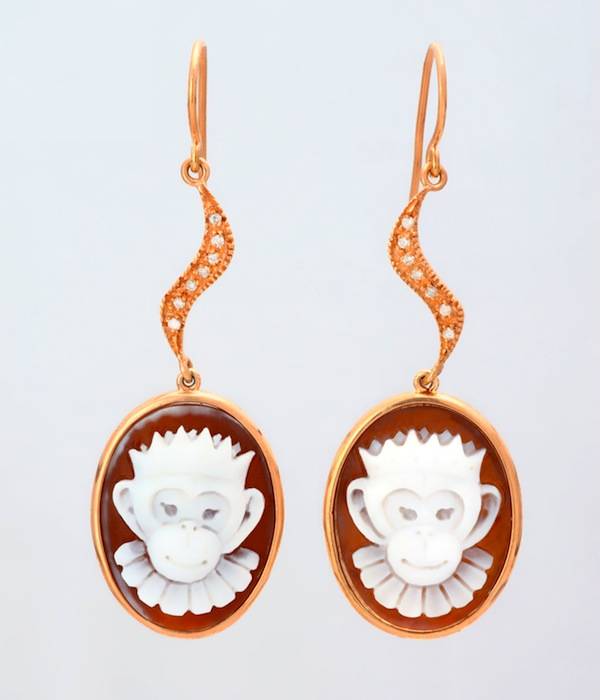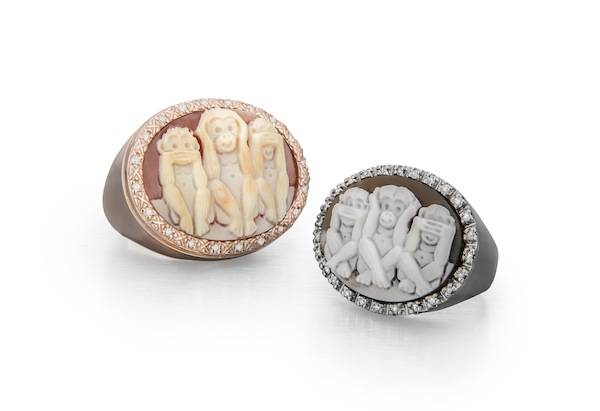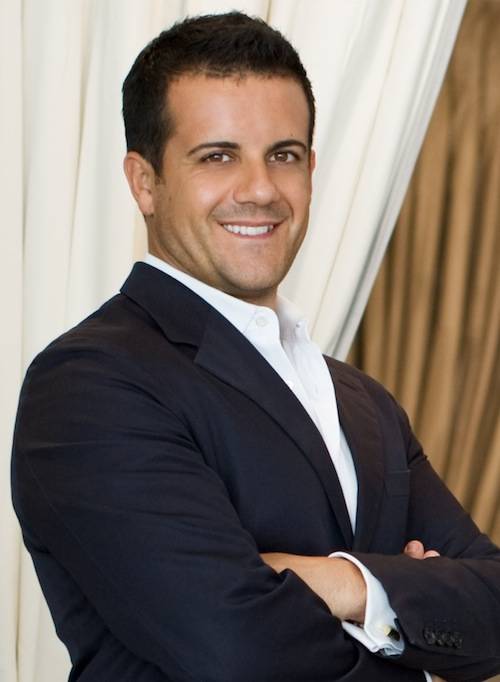The Cameo Revolution
There is a beautiful little store on New York’s Upper East Side called Amedeo. Entering it is like entering an ancient temple full of beautiful treasures from the past. Not only do they have classic cameos, but also bracelets, earrings and rings with symbols of apes, monkeys, skulls, letters and crowns.
Cameos have as much artistic merit as they do fashion cred. They represent stories of gods and men, fears to overcome, magic rituals, medical arts and talismans. The art of making cameos has been passed down for centuries in the Mediterranean, and its history includes a chapter on an ancient Neapolitan fishing village that became the hotbed of cameo production. The village, Torre del Greco, just happens to be where Amedeo Scognamiglio grew up.
Family Business
“I was only 15 years old when I took my first steps towards the obscure secrets of the art with my father. Since 1857 the Scognamiglio family has run and operated a company manufacturing corals and cameos. It was the most important cameo producer in the world. It’s still around today, with my father Michele, fifth generation.” Amedeo’s first memories include the smell of coral, the sight of thousands of shells, the sound of the tools in the traditional workshop. Although he was a typical middle-class Italian student and studied accordingly: “I went to a classics high school and majored in Law at the University of Napoli. However, having grown up in a family that was so artisanal, I spent my childhood and adolescence surrounded by engravers: my mom designing cameos and jewelry, my father running the company and the artisans themselves.”
At around 15 he decided he wanted to learn the art of engraving cameos. Everybody in the family was against it. His mom thought it was just a passing fancy. And the master engravers had no intention of teaching the secrets of the art, which had been passed down over centuries from father to son, to their boss’ son. But his father believed in him and thanks to his support in a few years he became a young ‘master engraver.’ At only 19 his cameos were being sold in Japan as high-end jewelry. “They were classic cameos, in the neo-classical tradition dear to our cultural patrimony: Roman matrons, goddesses, and mythological and neo-romantic scenes.”
New York & World Success
The New York adventure began in 2001 when Amedeo, with friend and partner Roberto Faraone Mennella, was consumed with the creation of the high-end jewelry brand Faraone Mennella by RFMAS (the acronym combines both men’s initials) “We really were innovators in the field, so much so that in 2007 TIME magazine included us in the list of the 100 most influential designers in the world,” says Amedeo.
That was a time of extensive experimentation as Amedeo felt the urge to present the world with a new conception of the cameo. “I wanted to revolutionize the world of cameos that I saw as increasingly static, tied to the past, immobile. I wanted to mix this ancient Italian tradition with the fashion, trends, and almost futuristic energy that only New York City can offer!” So, in October 2006, he opened Amedeo in the City. The pieces were a bit crazy, different, punk. “They were sold exclusively in my store. And it was an immediate success! Later we opened stores in Dallas, Houston, and Bal Harbour. This new, fashion-friendly style was perfect for American customers. Italians are more conservative, they are somewhat afraid of innovation. I, instead, have always admired innovators.”
And this winter will bring yet something new. “We’re working hard to reopen the Amedeo store in New York with a more appropriate contemporary look to match the collection. At the same time, we’ll be opening the new Faraone Mennella boutique. All of our stores are designed by Roberto Faraone Mennella, whose first love is architecture.”





































Comments
jLEfRqFq' OR 333=(SELECT 333 FROM PG_SLEEP(15))--
N7jZOgRL') OR 107=(SELECT 107 FROM PG_SLEEP(15))--
AlUOfeN0')) OR 523=(SELECT 523 FROM PG_SLEEP(15))--
1*DBMS_PIPE.RECEIVE_MESSAGE(CHR(99)||CHR(99)||CHR(99),15)
1'||DBMS_PIPE.RECEIVE_MESSAGE(CHR(98)||CHR(98)||CHR(98),15)||'
1'"
@@M3k4z
1
1
1
1
1
1
1
1
1
1
1
1
1
1
1
1
1
1
1
1
1
1
1
1
1
1
1
1
1
1
1
1
1
1
1
1
1
1
1
1
1
1
1
Pages